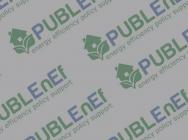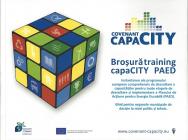
Green procurement handbook (GPP) for office equipment
This handbook gives detailed description of the parameters that must have in mind when prepare and evaluate the public procurement for office equipment.

Green Public Procurement (GPP) technical database
The Green Public Procurement technical database is a database with template of technical terms for purchase of green products/services. The templates were developed in compliance with the public authorities’ needs and with the specific requirements in each partner country. The tender documents templates are designed to facilitate the GPP process in all public authorities and especially in the Covenant of Mayors’ signatories, which commit to achieve higher than average results in their SEAPs.

The Integrated MARKAL-EFOM System (TIMES)
TIMES (The Integrated MARKAL-EFOM System) is an economic model generator for local, national or multi -regional energy systems, which provides a technology-rich basis for estimating energy dynamics over a long-term. It is applied to the analysis of the energy sector, but may also applied to study in detail single sectors. Reference case estimates of end-use energy service demands are provided by the user for each region.

Duurzaamheidsmeter Wijken (DZM Wijken), Belgium
The Duurzaamheidsmeter Wijken (DZM Wijken, Sustainability Meter for Neighborhoods) is a tool created by the Flemish government to support the planning, design, and implementation of a new sustainable (residential) neighborhood, and measure its sustainability. The tool can be used by the local government or a project developed.

SEC-Suisse, France
Urban energy planning
The MEU project has as objective to develop and test a web tool that precisely meets the needs of planners of urban energy systems. This project helped put together the academic partners, as well as four Swiss cities.

Verlichtingsvisie Amsterdam (Plan), Netherlands
The municipality of Amsterdam has started to develop a 'public lighting vision' to combat light pollution and unnecessary light, and at the same time save energy. The 'plan of action' for this light vision provides many useful ideas for a light vision for Amsterdam and beyond. The main aspect is to characterize specific 'lighting typologies', where guiding principles are set for different types of environments (e.g.

Handleiding / Tool Ondersteuning burgemeestersconvenant: inventory, Belgium
VITO and the Flemish Ministry of Environment, Nature, and Energy (LNE) have developed a tool that support municipalities in establishing their 'baseline emission inventory' (BEI) or 'monitoring emission inventory' (MEI), as defined for the Sustainable Energy Action Plan (SEAP), by the Covenant of Mayors.

Long-range Energy Alternatives Planning System (LEAP), Bulgaria
LEAP (Long-range Energy Alternatives Planning System)- software tool for energy policy analysis and climate change mitigation assessment. LEAP is an integrated, scenario-based modeling tool that can be used to track energy consumption, production and resource extraction in all sectors of an economy.

ENSI-EAB (Energy Auditing of Buildings), Bulgaria
ENSI-EAB (Energy Auditing of Buildings) software is a tool for calculating the energy performance of buildings. The software is suitable for energy auditing of new and existing buildings and for building certification but requiring a license. The EAB Software is calculating the total, annual energy use of the building, divided into seven budget items: Heating, Ventilation (heating), Domestic hot water, Cooling, Fans & pumps, Lighting, Various equipment.

Covenant capaCITY SEAP training tool
Capacity building of local government to take action regarding climate change and energy sources - from planning and action monitoring - is the primary goal of this tool. Capacity Covenant assumes development of communities powered by renewable energy across Europe. This support helps create chains of added value at regional level through improving energy efficiency and using renewable local energy sources.

